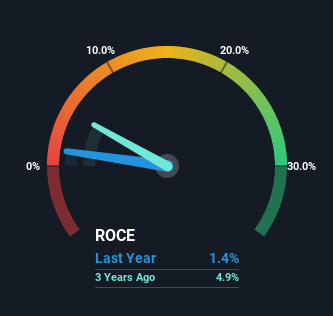- Hong Kong
- /
- Electronic Equipment and Components
- /
- SEHK:3336
These Return Metrics Don't Make Ju Teng International Holdings (HKG:3336) Look Too Strong
What financial metrics can indicate to us that a company is maturing or even in decline? Typically, we'll see the trend of both return on capital employed (ROCE) declining and this usually coincides with a decreasing amount of capital employed. This reveals that the company isn't compounding shareholder wealth because returns are falling and its net asset base is shrinking. On that note, looking into Ju Teng International Holdings (HKG:3336), we weren't too upbeat about how things were going.
Understanding Return On Capital Employed (ROCE)
Just to clarify if you're unsure, ROCE is a metric for evaluating how much pre-tax income (in percentage terms) a company earns on the capital invested in its business. To calculate this metric for Ju Teng International Holdings, this is the formula:
Return on Capital Employed = Earnings Before Interest and Tax (EBIT) ÷ (Total Assets - Current Liabilities)
0.014 = HK$129m ÷ (HK$16b - HK$7.0b) (Based on the trailing twelve months to June 2022).
Thus, Ju Teng International Holdings has an ROCE of 1.4%. Ultimately, that's a low return and it under-performs the Electronic industry average of 7.4%.
View our latest analysis for Ju Teng International Holdings

Historical performance is a great place to start when researching a stock so above you can see the gauge for Ju Teng International Holdings' ROCE against it's prior returns. If you'd like to look at how Ju Teng International Holdings has performed in the past in other metrics, you can view this free graph of past earnings, revenue and cash flow.
The Trend Of ROCE
There is reason to be cautious about Ju Teng International Holdings, given the returns are trending downwards. Unfortunately the returns on capital have diminished from the 5.3% that they were earning five years ago. On top of that, it's worth noting that the amount of capital employed within the business has remained relatively steady. Since returns are falling and the business has the same amount of assets employed, this can suggest it's a mature business that hasn't had much growth in the last five years. So because these trends aren't typically conducive to creating a multi-bagger, we wouldn't hold our breath on Ju Teng International Holdings becoming one if things continue as they have.
On a side note, Ju Teng International Holdings' current liabilities have increased over the last five years to 43% of total assets, effectively distorting the ROCE to some degree. Without this increase, it's likely that ROCE would be even lower than 1.4%. What this means is that in reality, a rather large portion of the business is being funded by the likes of the company's suppliers or short-term creditors, which can bring some risks of its own.
In Conclusion...
All in all, the lower returns from the same amount of capital employed aren't exactly signs of a compounding machine. And long term shareholders have watched their investments stay flat over the last five years. That being the case, unless the underlying trends revert to a more positive trajectory, we'd consider looking elsewhere.
If you'd like to know more about Ju Teng International Holdings, we've spotted 2 warning signs, and 1 of them makes us a bit uncomfortable.
For those who like to invest in solid companies, check out this free list of companies with solid balance sheets and high returns on equity.
New: Manage All Your Stock Portfolios in One Place
We've created the ultimate portfolio companion for stock investors, and it's free.
• Connect an unlimited number of Portfolios and see your total in one currency
• Be alerted to new Warning Signs or Risks via email or mobile
• Track the Fair Value of your stocks
Have feedback on this article? Concerned about the content? Get in touch with us directly. Alternatively, email editorial-team (at) simplywallst.com.
This article by Simply Wall St is general in nature. We provide commentary based on historical data and analyst forecasts only using an unbiased methodology and our articles are not intended to be financial advice. It does not constitute a recommendation to buy or sell any stock, and does not take account of your objectives, or your financial situation. We aim to bring you long-term focused analysis driven by fundamental data. Note that our analysis may not factor in the latest price-sensitive company announcements or qualitative material. Simply Wall St has no position in any stocks mentioned.
About SEHK:3336
Ju Teng International Holdings
An investment holding company, manufactures and sells casings for notebook computer and handheld devices in the People’s Republic of China and internationally.
Adequate balance sheet and slightly overvalued.
Similar Companies
Market Insights
Community Narratives



